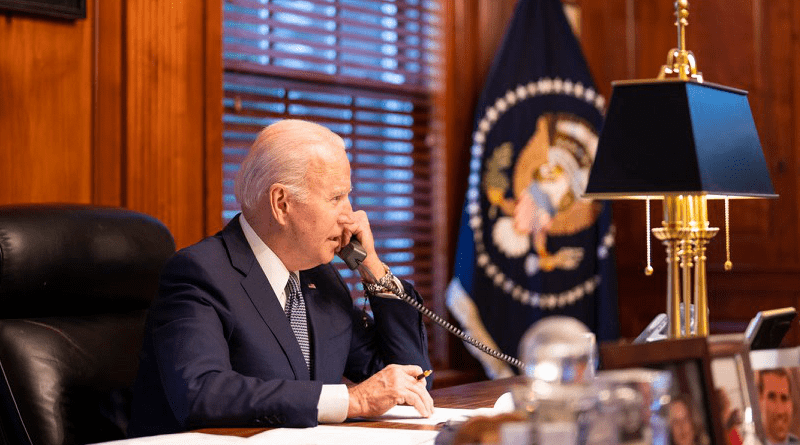Biden, Putin Agree To Intensify Diplomacy Early Next Year Amid Tensions Over Ukraine
By RFE RL
(RFE/RL) — U.S. President Joe Biden and Russian President Vladimir Putin have spoken by phone for the second time this month amid rising tensions over a buildup of Russian troops near the border with Ukraine and the Kremlin’s demands for sweeping security guarantees from NATO.
During the 50-minute call on December 30, Biden told Putin that the United States and its partners would respond “decisively” if Russia launches an attack on Ukraine while also expressing support for diplomacy to de-escalate tensions, the White House said.
The phone call came as U.S. and Russian officials prepare to meet on January 10 in Geneva to discuss arms control and mounting tensions over Ukraine under their bilateral Strategic Stability Dialogue.
That meeting will be followed by separate talks between Russia and NATO on January 12, while Russia and the Organization for Security and Cooperation in Europe (OSCE), which includes the United States and its European allies, will meet January 13.
“President Biden also expressed support for diplomacy, starting early next year with the bilateral Strategic Stability Dialogue, at NATO through the NATO-Russia Council, and at the Organization for Security and Cooperation in Europe,” the White House said. “President Biden reiterated that substantive progress in these dialogues can occur only in an environment of de-escalation rather than escalation.”
During their last call on December 7, Biden warned his counterpart of “severe consequences” if Russian troops were to attack Ukraine. That was followed by further U.S. and European warnings of crushing economic sanctions if Russia escalates against Ukraine.
In the latest talks, Putin told Biden that any sanctions would be a “colossal mistake” that would rupture ties between Russia and the United States, the Kremlin said.
But Kremlin aide Yuri Ushakov said Russia was satisfied with the phone conversation and the prospects for further diplomacy early next year, which he said centered on security guarantees that Moscow wants from the West.
The Kremlin earlier this month publicly issued a list of demands that include a call for NATO commitments not to accept new member states that were once part of the Soviet Union, such as Ukraine and Georgia.
Moscow also wants NATO to halt military drills near its borders and roll back military deployments in Central and Eastern Europe.
The Biden administration has said some of Russia’s demands are “unacceptable,” standing firm in the position that countries such as Ukraine have the right to choose their own foreign and security policy.
However, U.S. officials say there may be room to negotiate some of the other proposals that fall under the arms control agenda between Washington and Moscow.
John Herbst, the former U.S. ambassador to Ukraine, said Putin had sought another phone call “to build on the momentum” he perceived coming out of his last discussion with Biden on December 7.
Putin “still believes he can get a concession or two out of us,” Herbst said, adding that just holding the call itself is a “kind of concession” to the Russian leader.
Threat Of Invasion
Russia has amassed about 100,000 troops near its border with Ukraine in what Western capitals worry could be a prelude to an invasion.
The Kremlin denies it intends to launch an invasion, instead accusing Ukraine and NATO of provocations.
However, Russia has a history of aggression against its smaller neighbor.
It invaded and annexed Ukraine’s Crimean Peninsula in 2014 and backs separatists in eastern Ukraine fighting a nearly eight-year war against Kyiv’s forces.
Peace talks to end the fighting have failed as Moscow and Kyiv disagree over the interpretation of the framework signed in 2015 known as the Minsk agreements. Germany and France are mediating those talks.
Herbst said he doesn’t expect Russia to invade Ukraine and sees the buildup as an attempt to extract concessions from the West or Kyiv.
“I think he’s looking again to use this crisis — which he created — to see if there’s some wiggle room, either from the U.S. or from Germany and France in terms of the Minsk talks or from Ukraine,” said Herbst, who is now an analyst at the Washington-based Atlantic Council.
Russia’s military buildup has sparked a flurry of transatlantic diplomacy this month as Biden and top administration officials seek to coordinate policy with European allies and Ukraine, including the threat of severe economic sanctions against Moscow if Russia were to invade Ukraine.
Further Russian aggression against Ukraine could also be met by bolstering NATO forces on the alliance’s eastern flank, something the Kremlin wants to avoid.
U.S. officials have emphasized that no decisions about Europe’s security architecture would be made without agreement from Ukraine and European allies.
“We have heard very clearly from our partner, and we hear constantly that all issues related to Ukraine will be resolved together with Ukraine” including its NATO membership aspiraitons, Ukraine’s ambassador to the United States Oksana Markarova, told RFE/RL’s Ukrainian Service in an interview to be aired on January 1 .
U.S. Secretary of State Antony Blinken spoke with Ukrainian President Volodymyr Zelenskiy ahead of Biden’s call with Putin to reiterate Washington’s “unwavering support for Ukraine’s independence, sovereignty, and territorial integrity,” the State Department said.
Biden plans to speak with Zelenskiy soon after the call with Putin.

